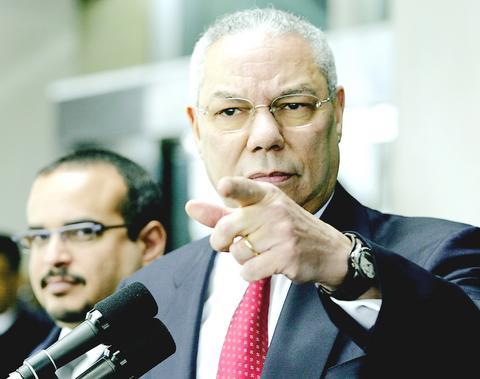US Secretary of State Colin Powell said on Monday he had told Pakistan's President Pervez Musharraf he must pull up the nuclear smuggling ring led by its disgraced nuclear hero "by its roots."
Powell spoke publicly for the first time since a telephone call with Musharraf late Friday about the scandal over nuclear scientist Abdul Qadeer Khan, who admitted leaking nuclear secrets to Iran, Libya and North Korea.
"The Pakistani government has done quite a bit now to roll up the network," Powell told reporters.

PHOTO: AFP
"I said to President Musharraf that we wanted to learn as much as we could about what Mr. Khan and the network was up to, and it has to be pulled up by its roots and examined to make sure that we have left nothing behind," Powell said.
"He assured me that that was his objective as well, and that he would share with us all of the information that they came up with," Powell said.
Powell said he also spoke to Musharraf about the pardon granted to Khan.
Pakistan said Sunday that Musharraf had assured Powell that no such proliferation activity will happen again in the country.
The country's nuclear program is now "under firm control" of the National Command and Control Authority which has taken steps to prevent proliferation in future, Musharraf told Powell, aides said.
Powell discounted reports from Pakistan that he was about to visit the country to discuss the scandal.
"I have no plans to travel to Pakistan," he said, adding he read "with interest" reports quoting a government official in Pakistan as saying he planned to visit the country in "the near future."
"But neither in that conversation or in any other conversations have I indicated that a trip was imminent."
The US, which for months said it believes there has been no proliferation since Musharraf took power in a coup in 1999, takes his undertakings that no such leaks are now taking place seriously.
There has been speculation that covert US teams may already be in Pakistan, securing its nuclear facilities, or carrying out inspections to prevent further proliferation.
But Washington has been careful to not put heavy public pressure on Musharraf, concerned that he could be weakened politically if his hardline domestic political opponents see him as bowing to US pressure.
Musharraf defended his handling of the scandal and his pardon for Khan in an interview with NBC on Sunday.
"The dilemma is: he's a great man, he's a hero, and he's a hero of every individual in the street ... Yet he has done something which could bring harm to the nation. Now how do I deal with it? We had to handle it very carefully," Musharraf said.

A fire caused by a burst gas pipe yesterday spread to several homes and sent a fireball soaring into the sky outside Malaysia’s largest city, injuring more than 100 people. The towering inferno near a gas station in Putra Heights outside Kuala Lumpur was visible for kilometers and lasted for several hours. It happened during a public holiday as Muslims, who are the majority in Malaysia, celebrate the second day of Eid al-Fitr. National oil company Petronas said the fire started at one of its gas pipelines at 8:10am and the affected pipeline was later isolated. Disaster management officials said shutting the

US Vice President J.D. Vance on Friday accused Denmark of not having done enough to protect Greenland, when he visited the strategically placed and resource-rich Danish territory coveted by US President Donald Trump. Vance made his comment during a trip to the Pituffik Space Base in northwestern Greenland, a visit viewed by Copenhagen and Nuuk as a provocation. “Our message to Denmark is very simple: You have not done a good job by the people of Greenland,” Vance told a news conference. “You have under-invested in the people of Greenland, and you have under-invested in the security architecture of this

UNREST: The authorities in Turkey arrested 13 Turkish journalists in five days, deported a BBC correspondent and on Thursday arrested a reporter from Sweden Waving flags and chanting slogans, many hundreds of thousands of anti-government demonstrators on Saturday rallied in Istanbul, Turkey, in defence of democracy after the arrest of Istanbul Mayor Ekrem Imamoglu which sparked Turkey’s worst street unrest in more than a decade. Under a cloudless blue sky, vast crowds gathered in Maltepe on the Asian side of Turkey’s biggest city on the eve of the Eid al-Fitr celebration which started yesterday, marking the end of Ramadan. Ozgur Ozel, chairman of the main opposition Republican People’s Party (CHP), which organized the rally, said there were 2.2 million people in the crowd, but

JOINT EFFORTS: The three countries have been strengthening an alliance and pressing efforts to bolster deterrence against Beijing’s assertiveness in the South China Sea The US, Japan and the Philippines on Friday staged joint naval drills to boost crisis readiness off a disputed South China Sea shoal as a Chinese military ship kept watch from a distance. The Chinese frigate attempted to get closer to the waters, where the warships and aircraft from the three allied countries were undertaking maneuvers off the Scarborough Shoal — also known as Huangyan Island (黃岩島) and claimed by Taiwan and China — in an unsettling moment but it was warned by a Philippine frigate by radio and kept away. “There was a time when they attempted to maneuver